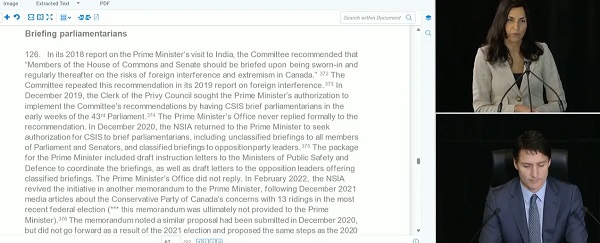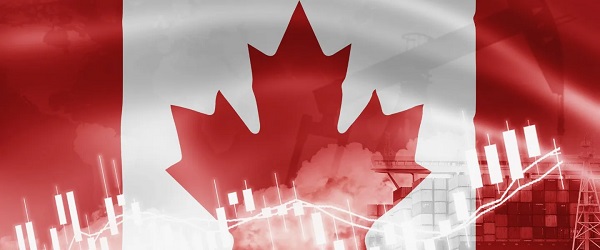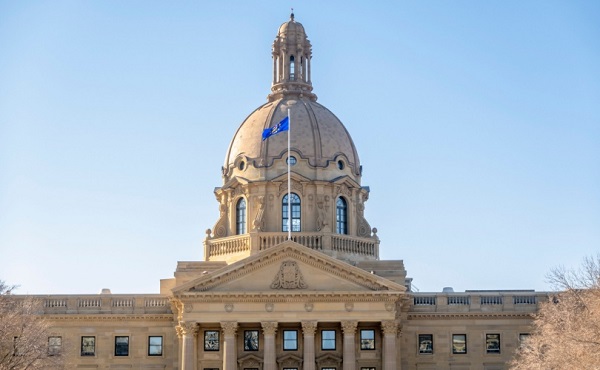Uncategorized
Breaking: Trudeau Admits Missing At Least Five Crucial Reports Or Memos Intended For Him to Authorize Defensive Briefs to MPs

Justin Trudeau Describes For First Time His View of “PRC Targeting Paper” Held Back By His Advisor in 2023
For the first time, Canada’s Prime Minister Justin Trudeau has testified on his view of two explosive Canadian intelligence reports, including the “Targeting Paper,” which described how Chinese diplomats assessed Canadian MPs based on how helpful or hurtful they could be to Beijing. Trudeau confirmed that this report was not shared with him by his key security advisor, Jody Thomas.
Additionally, Trudeau addressed three memos starting in 2019 that intended to brief him on foreign interference threats, all of which he claimed never reached his desk, with the intended briefings for Parliamentarians, which he was requested to authorize, only occurring in June 2024.
The inquiry into foreign interference in Canada’s elections has uncovered deep, ongoing divisions between Trudeau’s top aides and Canada’s intelligence community, with particular focus on two pivotal reports: the CSIS Targeting Paper and the PCO January 2022 Special Report. These documents, which detail how Beijing has sought to influence Canadian politics, have become central to understanding how the government responded—or failed to respond—to the growing threat of interference.
The CSIS Targeting Paper, drafted in 2021 and circulated to a small number of public servants in 2023, “named names” and outlined how Chinese diplomats categorized Canadian parliamentarians into three groups: those friendly towards Beijing, those neutral or potentially persuadable, and those deemed antagonistic due to their criticism of China’s human rights record, particularly on issues like the Uyghurs and Hong Kong. During his testimony, Trudeau played down the significance of this report, arguing that such categorization is a normal part of diplomacy.
“What the targeting paper actually talks about is that China has broadly classified parliamentarians in their diplomatic activities—some as being positive towards China, others who are neutral or convincible, and others who have spoken out against China,” Trudeau said. He noted that this diplomatic behavior was not surprising or new to him, comparing it to Canada’s own tactics during the NAFTA negotiations with the Trump administration. “That’s just a part of diplomacy right there,” he claimed.
However, Trudeau acknowledged that despite some “interesting tidbits” in the report, his National Security Intelligence Advisor (NSIA) had decided not to pass it on to him in 2021, deeming it not significantly relevant to his understanding of China’s behavior. “I have faith, having looked at the paper, that it was indeed the right decision by the National Security Intelligence Advisor—that it wasn’t a document that significantly added in a relevant way to my understanding of the situation.”
The actual contents of this paper are unknown, and blocked from the Commission by Trudeau’s Attorney General.
The PCO January 2022 Special Report, reviewed by The Bureau, outlines an alarming situation. Based on over 100 CSIS reports, it detailed a covert network that implicated 11 Toronto-area candidates in the 2019 federal election in interference operations, involving clandestine fund transfers from the Toronto Chinese Consulate into proxy networks. This report stemmed from a sensitive investigation in the Greater Toronto Area, culminating in CSIS seeking a technical surveillance warrant in March 2021. The Special Report was flagged as highly sensitive and formed the backbone of the inquiry’s scrutiny of Chinese influence in Canadian elections.
Both of these reports became focal points in the inquiry, revealing deep disagreements between Trudeau’s political aides and intelligence officials. Katie Telford, Trudeau’s Chief of Staff, testified that Global Affairs Canada held a divergent view from CSIS, particularly regarding the scope of foreign interference threats. The inquiry has exposed a consistent reluctance within the Prime Minister’s Office (PMO) to act on intelligence warnings, reflecting a broader divide between diplomacy and national security.
Three Memos and Delayed Briefings
In addition to the two reports, Trudeau faced questioning over three memos that called for him to authorize broad briefings on foreign interference risks and plans to brief Parliamentarians. Commission Counsel pressed him on why these memos, intended to reach him in 2019, 2020, and 2021, were not acted on.
“These decision points didn’t get to me,” Trudeau stated, acknowledging the breakdown. “But I made it very clear throughout conversations that I would have approved of, and encouraged, briefings.”
“Nobody flagged this was something of importance that was stalled, and therefore, as you pointed out, they weren’t acted on in my office,” Trudeau concluded.
As a result, Parliamentarians were not briefed on foreign interference threats until June 2024, years after the intelligence reports had first raised the alarm.
“Do you have any idea why no reply was given to all of those seeking authorization?” Commissioner Hogue asked.
“In the third case, it actually didn’t get to my office,” Trudeau said, while offering no explanation for the second, and pointing to COVID-19 in the first.
Trudeau’s testimony, which continues today, combined with that of senior aides such as Telford and Brian Clow, highlighted the troubling rifts between the PMO and Canada’s intelligence agencies. The intelligence community, led by CSIS, has consistently sounded the alarm about Chinese interference in Canadian politics, while the PMO and Global Affairs have often pushed back on CSIS’s assessments.
The inquiry has revealed that Global Affairs and the PMO tended to downplay foreign interference concerns, particularly those involving China, in favor of maintaining diplomatic and economic ties. This stance has been at odds with CSIS, which has taken a much more hawkish view, warning of serious threats to Canada’s democratic system.
The Bureau is a reader-supported publication. To receive new posts and support my work, consider becoming a free or paid subscriber.
Uncategorized
New report warns WHO health rules erode Canada’s democracy and Charter rights

The Justice Centre for Constitutional Freedoms has released a new report titled Canada’s Surrender of Sovereignty: New WHO health regulations undermine Canadian democracy and Charter freedoms. Authored by Nigel Hannaford, a veteran journalist and researcher, the report warns that Canada’s acceptance of the World Health Organization’s (WHO) revised International Health Regulations (IHR) represents a serious erosion of national independence and democratic accountability.
The IHR amendments, which took effect on September 19, 2025, authorize the WHO Director-General to declare global “health emergencies” that could require Canada to follow directives from bureaucrats in Geneva, bypassing the House of Commons and the will of Canadian voters.
The WHO regards these regulations as “binding,” despite having no ability or legal authority to impose such regulations. Even so, Canada is opting to accept the regulations as binding.
By accepting the WHO’s revised IHR, the report explains, Canada has relinquished its own control over future health crises and instead has agreed to let the WHO determine when a “pandemic emergency” exists and what Canada must do to respond to it, after which Canada must report back to the WHO.
In fact, under these International Health Regulations, the WHO could demand countries like Canada impose stringent freedom-violating health policies, such as lockdowns, vaccine mandates, or travel restrictions without debate, evidence review, or public accountability, the report explains.
Once the WHO declares a “Pandemic Emergency,” member states are obligated to implement such emergency measures “without delay” for a minimum of three months.
Importantly, following these WHO directives would undermine government accountability as politicians may hide behind international “commitments” to justify their actions as “simply following international rules,” the report warns.
Canada should instead withdraw from the revised IHR, following the example of countries like Germany, Austria, Italy, Czech Republic, and the United States. The report recommends continued international cooperation without surrendering control over domestic health policies.
Constitutional lawyer Allison Pejovic said, “[b]y treating WHO edicts as binding, the federal government has effectively placed Canadian sovereignty on loan to an unelected international body.”
“Such directives, if enforced, would likely violate Canadians’ Charter rights and freedoms,” she added.
Mr. Hannaford agreed, saying, “Canada’s health policies must be made in Canada. No free and democratic nation should outsource its emergency powers to unelected bureaucrats in Geneva.”
The Justice Centre urges Canadians to contact their Members of Parliament and demand they support withdrawing from the revised IHR to restore Canadian sovereignty and reject blind compliance with WHO directives.
Uncategorized
CNN’s Shock Climate Polling Data Reinforces Trump’s Energy Agenda


From the Daily Caller News Foundation
As the Trump administration and Republican-controlled Congress move aggressively to roll back the climate alarm-driven energy policies of the Biden presidency, proponents of climate change theory have ramped up their scare tactics in hopes of shifting public opinion in their favor.
But CNN’s energetic polling analyst, the irrepressible Harry Enten, says those tactics aren’t working. Indeed, Enten points out the climate alarm messaging which has permeated every nook and cranny of American society for at least 25 years now has failed to move the public opinion needle even a smidgen since 2000.
Appearing on the cable channel’s “CNN News Central” program with host John Berman Thursday, Enten cited polling data showing that just 40% of U.S. citizens are “afraid” of climate change. That is the same percentage who gave a similar answer in 2000.
Dear Readers:
As a nonprofit, we are dependent on the generosity of our readers.
Please consider making a small donation of any amount here.
Thank you!
Enten’s own report is an example of this fealty. Saying the findings “kind of boggles the mind,” Enten emphasized the fact that, despite all the media hysteria that takes place in the wake of any weather disaster or wildfire, an even lower percentage of Americans are concerned such events might impact them personally.
“In 2006, it was 38%,” Enten says of the percentage who are even “sometimes worried” about being hit by a natural disaster, and adds, “Look at where we are now in 2025. It’s 32%, 38% to 32%. The number’s actually gone down.”
In terms of all adults who worry that a major disaster might hit their own hometown, Enten notes that just 17% admit to such a concern. Even among Democrats, whose party has been the major proponent of climate alarm theory in the U.S., the percentage is a paltry 27%.
While Enten and Berman both appear to be shocked by these findings, they really aren’t surprising. Enten himself notes that climate concerns have never been a driving issue in electoral politics in his conclusion, when Berman points out, “People might think it’s an issue, but clearly not a driving issue when people go to the polls.”
“That’s exactly right,” Enten says, adding, “They may worry about in the abstract, but when it comes to their own lives, they don’t worry.”
This reality of public opinion is a major reason why President Donald Trump and his key cabinet officials have felt free to mount their aggressive push to end any remaining notion that a government-subsidized ‘energy transition’ from oil, gas, and coal to renewables and electric vehicles is happening in the U.S. It is also a big reason why congressional Republicans included language in the One Big Beautiful Bill Act to phase out subsidies for those alternative energy technologies.
It is key to understand that the administration’s reprioritization of energy and climate policies goes well beyond just rolling back the Biden policies. EPA Administrator Lee Zeldin is working on plans to revoke the 2010 endangerment finding related to greenhouse gases which served as the foundation for most of the Obama climate agenda as well.
If that plan can survive the inevitable court challenges, then Trump’s ambitions will only accelerate. Last year’s elimination of the Chevron Deference by the Supreme Court increases the chances of that happening. Ultimately, by the end of 2028, it will be almost as if the Obama and Biden presidencies never happened.
The reality here is that, with such a low percentage of voters expressing concerns about any of this, Trump and congressional Republicans will pay little or no political price for moving in this direction. Thus, unless the polls change radically, the policy direction will remain the same.
David Blackmon is an energy writer and consultant based in Texas. He spent 40 years in the oil and gas business, where he specialized in public policy and communications.
-

 Business22 hours ago
Business22 hours agoTrans Mountain executive says it’s time to fix the system, expand access, and think like a nation builder
-

 Business2 days ago
Business2 days agoCarney government risks fiscal crisis of its own making
-

 Energy22 hours ago
Energy22 hours agoCAPP calls on federal government to reset energy policy before it’s too late
-

 Alberta2 days ago
Alberta2 days agoB.C. would benefit from new pipeline but bad policy stands in the way
-

 Frontier Centre for Public Policy2 days ago
Frontier Centre for Public Policy2 days agoChurches Are All That Stands Between Canada And Tyranny
-

 Alberta2 days ago
Alberta2 days agoAlberta introduces bill allowing province to reject international agreements
-

 Media15 hours ago
Media15 hours agoCarney speech highlights how easily newsrooms are played by politicians announcing the same things over and over again
-

 Business2 days ago
Business2 days agoTrump Admin Establishing Council To Make Buildings Beautiful Again





